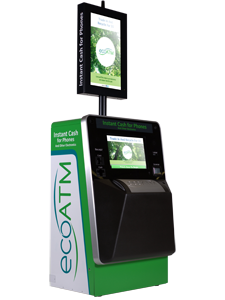- Home
- Mobiles
- Mobiles News
- Recycling ATM gives cash for old mobile phones
Recycling ATM gives cash for old mobile phones

Californian company ecoATM has rolled out the machine that is sophisticated enough to see if a screen is cracked, evaluate unwanted goods for resale and recycling - hoping to inspire people to go green.
Old gadgets still have a value as either an affordable alternative, spare parts, or even melted down for the residual value of the metals inside. ecoATM has developed the device with support from the US National Science Foundation (NSF).
The ecoATM finds second homes for three-fourths of the phones it collects, sending the remaining ones to environmentally responsible recycling channels to reclaim any rare earth elements and keep toxic components from landfills. More than 300 kiosks are hoped to be rolled out across the US by the year-end, the Daily Mail reported.
Company co-founder Mark Bowles said: "The basic technologies of machine vision, artificial intelligence, and robotics that we use have existed for many years, but none have been applied to the particular problem of consumer recycling."
"But we've done much more than just apply existing technology to an old problem - we developed significant innovations for each of those basic elements to make the system commercially viable," Bowles said.
Using artificial intelligence (AI) ecoATM kiosks can differentiate varied consumer electronics products and determine a market value. If the value is acceptable, users have the option of receiving cash or store credit for their trade - or donating all or part of the compensation to one of several charities.
The system began as a wooden-box prototype that required the presence of an ecoATM representative to ensure that users were being honest with their trades.
The team therefore developed AI that delivered 97.5 percent accuracy for device recognition, removing human oversight and making the system viable. They are currently trying to eliminate the accuracy gap.
"We are now able to tell the difference between cracked glass on a phone, which is an inexpensive fix, versus a broken display or bleeding pixels, which is generally fatal for the device," Bowles added.
The company's databases are now trained with images of more than 4,000 devices, and when an identification mistake occurs, the system learns from that mistake.
When a phone is presented, the AI system conducts a visual inspection, identifies the device model and provides one of 23 possible connector cables to link it to the network.
A value is then determined based on the company's real-time, worldwide, pre-auction system in which a broad network of buyers have already bid on the old technology, so the kiosk can immediately provide compensation.
Get your daily dose of tech news, reviews, and insights, in under 80 characters on Gadgets 360 Turbo. Connect with fellow tech lovers on our Forum. Follow us on X, Facebook, WhatsApp, Threads and Google News for instant updates. Catch all the action on our YouTube channel.
Related Stories
- Samsung Galaxy Unpacked 2026
- iPhone 17 Pro Max
- ChatGPT
- iOS 26
- Laptop Under 50000
- Smartwatch Under 10000
- Apple Vision Pro
- Oneplus 12
- OnePlus Nord CE 3 Lite 5G
- iPhone 13
- Xiaomi 14 Pro
- Oppo Find N3
- Tecno Spark Go (2023)
- Realme V30
- Best Phones Under 25000
- Samsung Galaxy S24 Series
- Cryptocurrency
- iQoo 12
- Samsung Galaxy S24 Ultra
- Giottus
- Samsung Galaxy Z Flip 5
- Apple 'Scary Fast'
- Housefull 5
- GoPro Hero 12 Black Review
- Invincible Season 2
- JioGlass
- HD Ready TV
- Latest Mobile Phones
- Compare Phones
- Tecno Pova Curve 2 5G
- Lava Yuva Star 3
- Honor X6d
- OPPO K14x 5G
- Samsung Galaxy F70e 5G
- iQOO 15 Ultra
- OPPO A6v 5G
- OPPO A6i+ 5G
- Asus Vivobook 16 (M1605NAQ)
- Asus Vivobook 15 (2026)
- Brave Ark 2-in-1
- Black Shark Gaming Tablet
- boAt Chrome Iris
- HMD Watch P1
- Haier H5E Series
- Acerpure Nitro Z Series 100-inch QLED TV
- Asus ROG Ally
- Nintendo Switch Lite
- Haier 1.6 Ton 5 Star Inverter Split AC (HSU19G-MZAID5BN-INV)
- Haier 1.6 Ton 5 Star Inverter Split AC (HSU19G-MZAIM5BN-INV)







![[Partner Content] OPPO Reno15 Series: AI Portrait Camera, Popout and First Compact Reno](https://www.gadgets360.com/static/mobile/images/spacer.png)









